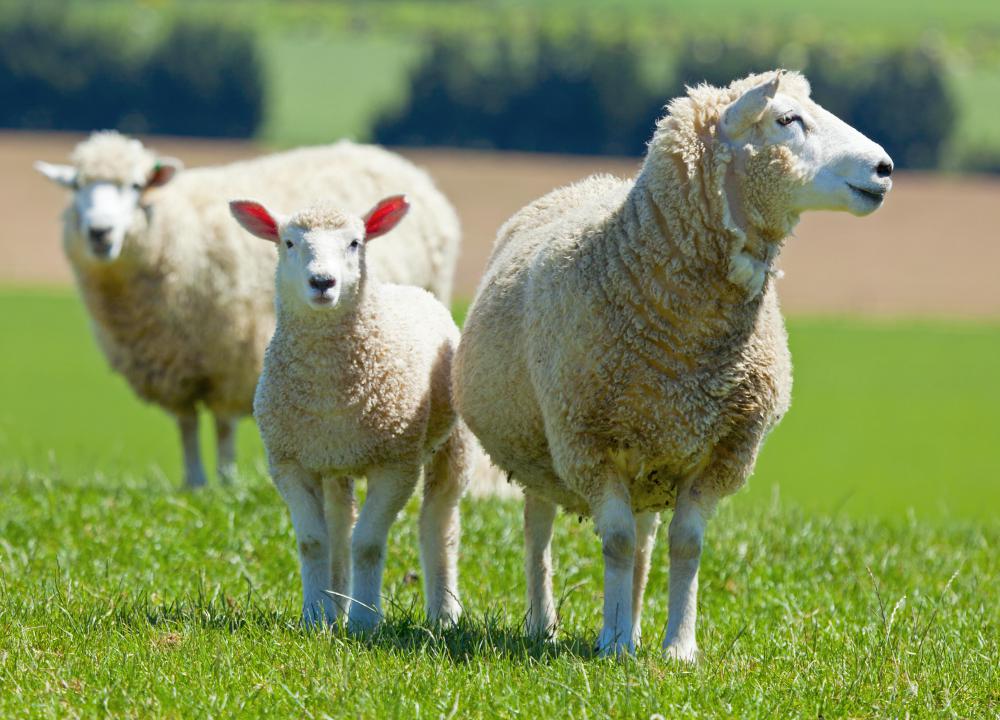At DelightedCooking, we're committed to delivering accurate, trustworthy information. Our expert-authored content is rigorously fact-checked and sourced from credible authorities. Discover how we uphold the highest standards in providing you with reliable knowledge.
What Is Halal Lamb?
Muslim religious rules specify a certain type of slaughter for animals, involving a cut throat and bleeding of the animal, and set out guidelines for the preparation of that meat. These rules make the meat halal, or permissible. Halal lamb is meat from a sheep that has undergone this process. Halal slaughter is sometimes controversial if stunning the animal first is not employed, as in the more common secular method.
For meat to be certified as halal, it has to be killed and handled in a certain way in the slaughterhouse and storage facility. All of these parameters are checked by a certification body in the country of production before the meat can be certified as halal. In the United States, for example, this function is performed by authorities like the American Halal Foundation (AHF). According to the AHF, lamb for halal slaughter must be slaughtered by a Muslim.

The sheep must also be alive at the time of slaughter. According to the guidelines set down by the AHF, before the cut, the slaughterer must invoke Allah by saying, "Bismillah," which means in the name of Allah. A sharp knife, which has not been used for nonhalal purposes, is then used to cut the windpipe, esophagus, and blood vessels in the neck of the sheep. This single cut is similar to the Jewish slaughter rules for kosher meat. To be halal lamb, the sheep has to be entirely bled.

Proponents of the halal slaughter method argue that the neck cut and subsequent heavy bleeding make the animal lose consciousness rapidly, and therefore, no pain occurs. A common method of slaughter in non-Islamic countries uses a bolt gun to stun animals before they are bled to death. Opponents of traditional halal slaughter are of the opinion that the bolt stunning method is instantaneous and ensures the animal does not feel pain when the slaughterer cuts the blood vessels and that larger animals like cattle may stay alive for minutes after the throat is cut.

Not all halal lamb is killed without a stunning step. For example, New Zealand halal lamb receive an electrical stunning before the bleeding step. The slaughterer must still ensure the animal is alive, but the stunning renders it unconscious. This combination of stunning and bleeding is sanctioned by some religious authorities, who say it is not against halal practice as long as the animal is alive at the time of slaughter. After the slaughter, halal lamb must not come into contact with foods that are not halal.
AS FEATURED ON:
AS FEATURED ON:















Discussion Comments
@pastanaga - The problem with using lamb in halal meals is that many of the countries with a demand for halal meat can't provide enough of their own. So other countries pick up the slack.
But, they aren't allowed to slaughter the animals on their own soil, because those carcasses might not be considered halal. So the animals are shipped, alive and packed into holds, to the countries which will slaughter them. Many of them will die on the way in deplorable conditions.
I agree that the method of slaughter for halal meats isn't the problem, but the transport of animals to satisfy those methods is a problem.
I'm not a vegetarian, but I do believe that if we are going to keep animals for food, we have a moral obligation to ensure that those animals were treated well before they die.
@croydon - Both halal and kosher practices aren't done because they were the best way of doing things for human health. You can argue that they continued in use because of that and you might even be right.
The fact remains that the people who use them think that they are obeying God by doing so. They aren't thinking about why their ancestors did it, or what it means in a study of human culture. They are obeying what they consider to be the law.
And frankly, I don't think they are causing pain and the methods are hygienic (or can be made so) by modern scientific standards, so why not? As long as it doesn't do any harm I think that religious expression is a human right and should be protected just like any other human right.
Halal and other practices like kosher traditions are rules that made sense back in the days without refrigeration, or without the ability to stun the animal before slaughter.
Both traditions state that the animal should not be panicking and should be killed as quickly as possible. This is as human as a person can be with primitive technology.
They also state that the animal should be alive and healthy before death and that it should be bled completely. Well, being alive and healthy protects the people who are going to eat the meat, because an unhealthy or dead animal might pass on disease or food poisoning. And keeping blood within the animal leaves it more likely to rot, particularly in hot places.
It's the best system for the time and place that it evolved, which is in the desert, thousands of years ago. Whether it is the best way to slaughter animals now, is what should be up for debate.
Post your comments